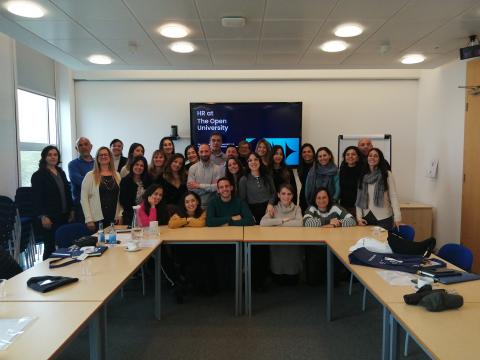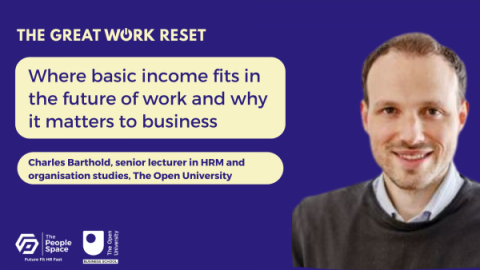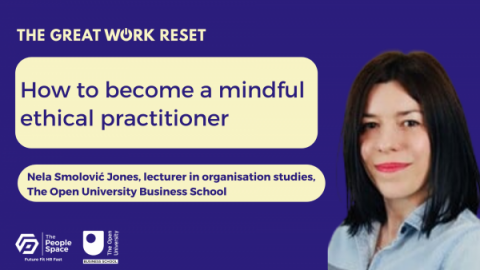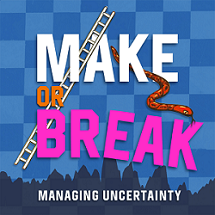People and Organisations

We are a diverse group of academics who research many aspects of work and organisations.
These can be broadly understood as centring on organisation studies and organisational psychology; and management and organisational learning, processes, change and innovation. Members of the department also have an interest in academic practices like research ethics and the politics of knowledge production.
Research into Employment and Equitable Futures
We seek to explore and shape the future direction of equitable futures, work and society with dedicated research into this area. In partnership with The People Space, this academic centre of excellence draws on the Department for People and Organisations' scholarly expertise on themes of identity, leadership, gender, bodies, ethics, power and learning to inform policy makers, organisational leaders, social practitioners and people from across contexts to work together to co-create innovative solutions for meeting these coming opportunities and challenges.
Gendered Organisational Practice
This research cluster takes feminist solidarity as a starting point to create a space where feminists of any gender can share insights and knowledge from academic study and practice. The cluster fosters continuous collaboration and exchange between practitioners and academics and provides a hub for those interested in developing equality through their research, but also for practitioners wanting to make their organisations more egalitarian and fairer places. Current areas of expertise include gendered working bodies, feminist organising and gender and sexuality.
Research interests
Organisation studies and organisational psychology
- Alternative organisations and organising
- Civil society organisations
- Corporate social responsibility
- Critical approaches to leadership and leadership dilemma
- Critical management studies
- Diversity in organisations
- Emotions in organisations
- Employee branding
- Financialisation and political and ethical responses
- Gender, sexuality, the body in organisations and how bodies are organised
- Human-animal relations in organisations
- Individual and group behaviour in organisational contexts
- The interplay between work and health
- Organisational democratic practice
- Organisational and individual identity, subjectivity, selfhood and the meaning of work
- Organisations, work and social inclusion
- Post-colonial relations in organisations
- Power, politics and organisations
- Professional occupations
- Precarious work
- The production, dissemination and contestation of meaning in organisations
- The psychology of financial behaviour
- Risk, uncertainty, and resilience
- Sociological accounts of work
- Transformations in technological and institutional conditions
Management and organisational learning, processes, change and innovation
- Change management
- Cross-cultural differences and self and group regulation in online learning
-
Collective organising and social learning processes
-
Decision-making under radical uncertainty
-
The development of business and management practices
-
Entrepreneurship
-
Formal and informal learning in organisations
-
Green HRM
-
Higher education management
-
Knowledge management
-
Management Information Systems
-
Managing inter-organisational relations in complex services
-
Management practices
-
Operations management
-
Serious games and the contribution of gamification to organisational learning and innovation
-
Strategic change
-
Supply chain management and behaviour
-
Supply chain analytics and modelling
-
Supply chain performance measurement systems
-
Sustainability and resilience in the supply chain
Academic practices
- Embodiment and affect in research
- The politics of academic knowledge production
- Research ethics
- Research methods
Academic Publications
Full details of our research publications can be found on Open Research Online and via our staff pages.
Teaching
Members of the Department teach across undergraduate, postgraduate and executive education modules in areas such as organisational behaviour, management of learning and change, professional development, human resource management, creativity, leadership, innovation, organisational culture and organisational development. We also run the CIPD accredited MSc in Human Resource Management.
Contact the Department for People and Organisations
For all department-related enquiries, please email us.
For all other enquiries, including student and alumni, please visit our contact us page.

How to design menopause leave policies that really support women in the workplace
More than 15 million women are in employment in the UK right now, which means menopause is undoubtedly a workplace issue. In this article, Jo Brewis, Professor of People and Organisations writes about how to design menopause leave policies that really support women in the workplace.

Learning different ways to do HR in different organisations and countries
Italian MSc Human Resource Management (HRM) students from the University of Cagliari were at the OU’s campus in Milton Keynes for two days in late April as part of a UK trip.

The rise and fall of Topshop. OU/BBC series lifts the lid on iconic brand’s fall from grace
The story of how a huge fashion brand fell dramatically to earth is the subject of a new two-part OU/BBC co–production.

Small bakery owners: we want your views!
Help us to create a better understanding of the state and needs of small bakeries in the UK

Self-employment: what is it, why do it and how has the pandemic affected it?
Professor Elizabeth Daniel discusses the lasting legacy of the pandemic on self-employment and homeworking, the ‘passionpreneur’ and describes how mental load is affecting self-employed women.

Academic reveals the psychology of spending this Christmas
Mark Fenton-O’Creevy is Professor of Organisational Behaviour and he advises that if you want to keep yourself in check this Christmas, you need to know what your triggers are and learn how to avoid them.

Where basic income fits in the future of work - and why it matters to business
Dr Charles Barthold explains what a basic income is, why the circumstances are right to test it now and why business should be involved in the debate

What’s wrong with talking about the menopause?
An OU academic is highlighting the difficulties working women encounter on World Menopause Day since many must live with debilitating symptoms impacting their performance at work.

How to become a more mindful ethical practitioner
Dr Nela Smolović-Jones discusses issues organisations need to consider today, from dealing with ‘wicked problems’ to gendered corruption, and offers her top tips for leaders to enable them to be mindful

It’s ‘Make or Break’ in new business leadership podcast
In life, facing tough decisions is always a possibility but in business, it’s only a matter of time. Anyone interested in business leadership can listen to a 12-episode podcast series, ‘Make or Break’.
News

How to design menopause leave policies that really support women in the workplace
More than 15 million women are in employment in the UK right now, which means menopause is undoubtedly a workplace issue. In this article, Jo Brewis, Professor of People and Organisations writes about how to design menopause leave policies that really support women in the workplace.
- How to design menopause leave policies that really support women in the workplace
- Learning different ways to do HR in different organisations and countries
- The rise and fall of Topshop. OU/BBC series lifts the lid on iconic brand’s fall from grace
- Small bakery owners: we want your views!
- Self-employment: what is it, why do it and how has the pandemic affected it?
